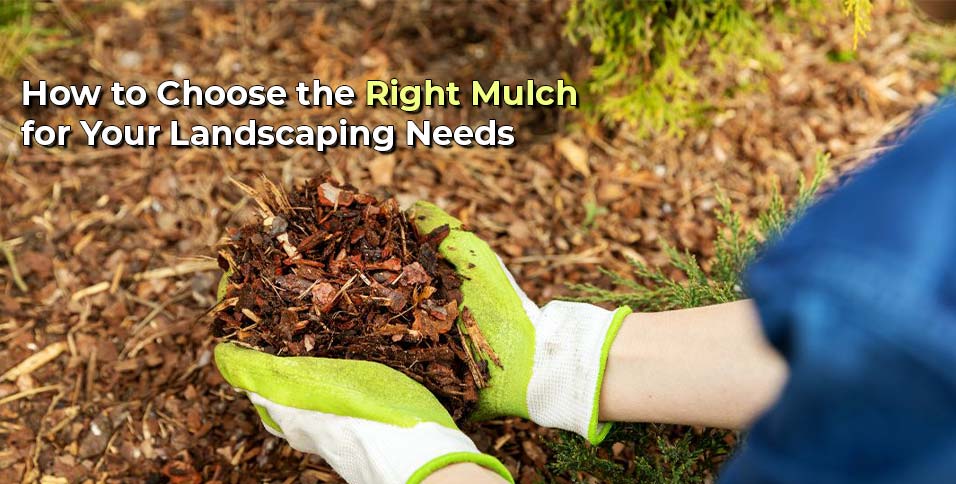When it comes to landscaping, mulch is a powerhouse. It enhances the aesthetics of your garden and plays a crucial role in maintaining soil health, retaining moisture, and suppressing weeds. However, with so many types of mulch available, choosing the right one for your landscaping needs can take time and effort. Here’s a guide to help you select the best mulch for your garden.
Understanding the Basics of Mulch
Mulch is a protective layer spread over soil to regulate its temperature, improve fertility, and reduce erosion. It comes in two main types:
- Organic Mulch: Derived from natural materials like wood chips, bark, straw, and compost.
- Inorganic Mulch: Made from non-biodegradable materials like rubber, stones, or landscape fabric.
Each type offers distinct advantages depending on your landscaping goals.
Factors to Consider When Choosing Mulch
- Purpose of Mulching
- Moisture Retention: If water conservation is your priority, opt for organic mulches like bark or straw. These materials help retain moisture, keeping your plants hydrated for longer.
- Weed Control: For areas prone to weed growth, heavier mulch, such as bark nuggets or rubber mulch, can act as a barrier, preventing weed seeds from germinating.
- Soil Enrichment: Compost or leaf mulch is excellent for improving soil health as they decompose and adds nutrients.
- Aesthetic Appeal
Mulch can also serve as a decorative element. If you’re looking to enhance the visual appeal of your garden:
- Coloured Mulch: Dyed wood chips in red, black, or brown can add colour to your landscaping.
- Natural Stone Mulch: Pebbles and gravel provide a clean, modern look, ideal for contemporary gardens.
- Climate and Weather Conditions
- Hot Climates: Light-colored mulches like straw or hay can reflect sunlight, keeping the soil cooler.
- Cold Climates: Dark-colored mulches, such as black plastic or dark wood chips, absorb heat, helping to warm the soil during cooler months.
- Type of Plants
- Vegetable Gardens: Use organic mulches like straw or compost to boost soil fertility and support plant growth.
- Flower Beds: Bark or wood chips work well, providing a clean look while benefiting soil health.
- Trees and Shrubs: Coarse mulches like bark nuggets offer long-lasting coverage and protect tree roots.
- Maintenance and Longevity
- Low-Maintenance: Inorganic mulches like stone or rubber require less frequent replacement and are ideal for areas that require long-term coverage.
- High-Maintenance: Organic mulches decompose over time, requiring periodic replenishment but offering more significant benefits to soil health.
Popular Types of Mulch
- Bark Mulch
- Best for: Flower beds, trees, and shrubs
- Benefits: Long-lasting, visually appealing, excellent for weed suppression.
- Straw and Hay
- Best for: Vegetable gardens
- Benefits: Excellent for moisture retention and soil temperature regulation.
- Compost
- Best for: General gardening
- Benefits: Improves soil fertility and promotes healthy plant growth.
- Rubber Mulch
- Best for: Playground areas, pathways
- Benefits: Long-lasting, suitable for weed control, and available in various colours.
- Gravel and Stone Mulch
- Best for: Decorative landscaping, xeriscaping
- Benefits: Durable, low-maintenance, and ideal for areas with poor drainage.
Tips for Mulching Effectively
- Prepare the Soil: Remove weeds and add a layer of compost before applying mulch to improve soil health.
- Apply the Right Depth: Use 2-4 inches of mulch to ensure adequate coverage without suffocating the plants.
- Keep Mulch Away from Plant Stems: Maintain a small gap around plant bases to prevent rot and pest issues.
- Replenish Regularly: Organic mulches decompose over time, so replenish them annually to maintain their benefits.
Conclusion
Choosing the right mulch is essential for maximising your landscaping efforts. By considering factors like your garden’s needs, climate, and aesthetic preferences, you can select a mulch that enhances your garden’s beauty and supports its health. Whether you opt for organic mulch’s natural richness or inorganic options’ durability, the right choice will help you achieve a thriving, low-maintenance landscape.
Mari Salome Malagar is a dedicated English teacher and versatile freelance content creator based in the Philippines. She is passionate about crafting compelling written content and specialises in producing and editing high-quality material for businesses and social media platforms.
Also Read: Mulcher Teeth: Types And Guide On Maintenance & Replacement Of Mulcher Teeth
















